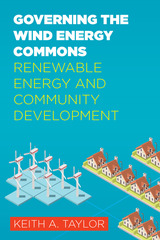
Wind energy is often framed as a factor in rural economic development, an element of the emerging “green economy” destined to upset the dominant greenhouse- gas-emitting energy industry and deliver conscious capitalism to host communities. The bulk of wind energy firms, however, are subsidiaries of the same fossil fuel companies that wrought havoc in shale-gas and coal-mining towns from rural Appalachia to the Great Plains. On its own, wind energy development does not automatically translate into community development.
In Governing the Wind Energy Commons, Keith Taylor asks whether revenue generated by wind power can be put to community well-being rather than corporate profit. He looks to the promising example of rural electric cooperatives, owned and governed by the 42 million Americans they serve, which generate $40 billion in annual revenue. Through case studies of a North Dakota wind energy cooperative and an investor-owned wind farm in Illinois, Taylor examines how regulatory and social forces are shaping this emerging energy sector. He draws on interviews with local residents to assess strategies for tipping the balance of power away from absentee-owned utilities.
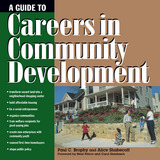
Community development -- the economic, physical, and social revitalization of a community, led by the people who live in that community -- offers a wide range of exciting and rewarding employment options. But until now, there has been no "road map" for professionals, volunteers, students, or anyone wishing to become involved in the field.
A Guide to Careers in Community Development describes the many different kinds of community development jobs available, ranging from community organizing, to financing housing and new businesses, to redeveloping brownfields. It offers advice on how to break into the field along with guidance for career advancement and lateral movement.
Following an introductory chapter that offers an overview and definition of community development and its history, the authors describe:
- different institutions in the field and how they fit together
- pros and cons of community development careers, with a self-assessment quiz for readers to use in analyzing their suitability for the field
- the work and skills involved in different kinds of positions
- how to prepare for and move up in a career
- how to land that first job
A Guide to Careers in Community Development is an essential reference for anyone interested in working in the community development field, including graduate and undergraduate students, volunteers, and mid-career professionals seeking a more fulfilling line of work.

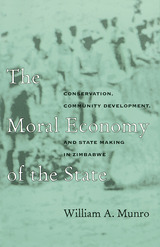
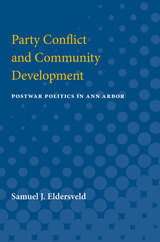
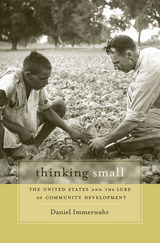
Winner of the Merle Curti Award in Intellectual History, Organization of American Historians
Co-Winner of the Society for U.S. Intellectual History Book Award
Thinking Small tells the story of how the United States sought to rescue the world from poverty through small-scale, community-based approaches. And it also sounds a warning: such strategies, now again in vogue, have been tried before, with often disastrous consequences.
“Unfortunately, far from eliminating deprivation and attacking the social status quo, bottom-up community development projects often reinforced them…This is a history with real stakes. If that prior campaign’s record is as checkered as Thinking Small argues, then its intellectual descendants must do some serious rethinking… How might those in twenty-first-century development and anti-poverty work forge a better path? They can start by reading Thinking Small.”
—Merlin Chowkwanyun, Boston Review
“As the historian Daniel Immerwahr demonstrates brilliantly in Thinking Small, the history of development has seen constant experimentation with community-based and participatory approaches to economic and social improvement…Immerwahr’s account of these failures should give pause to those who insist that going small is always better than going big.”
—Jamie Martin, The Nation
READERS
Browse our collection.
PUBLISHERS
See BiblioVault's publisher services.
STUDENT SERVICES
Files for college accessibility offices.
UChicago Accessibility Resources
home | accessibility | search | about | contact us
BiblioVault ® 2001 - 2024
The University of Chicago Press









